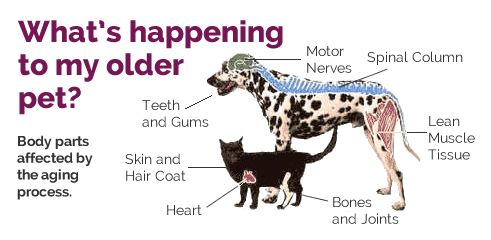Senior Pet Care for Your Dog or Cat
Our pets age much faster than we do. A small dog or cat ages approximately 5 times the rate of a person. A large dog ages at a rate of about 7 times a person. This means that one examination a year is the equivalent of once every 5-7 years in human terms. This is more than enough time for a disease process to gain a foothold and cause irreversible damage by the time of diagnosis.
Willowbend Animal Hospital performs a complete physical exam every six months on pets considered to be senior (5-7 years of age, depending on the breed). This exam is crucial in detecting subtle age-related changes that may affect the pet’s quality of life. There is not a diagnostic test available that surpasses or gives more vital information than a thorough physical exam. In conjunction with the examination, it is vitally important for the veterinary health care team to ask questions about the pet at home. Questions relating to the pets activity level, interaction with people, mobility, appetite, thirst level, house training issues, can point the doctor down the right path in determining the health of the pet. Another key component of evaluating the overall health of a senior pet is laboratory work (CBC/Chemistry profile, urinalysis, intestinal parasite screen) once yearly. These tests allow the doctor to look a bit deeper into the pet’s health. A problem not noted on examination might be detected on lab work.
| Dog's Age | Age in Human Years | Cat's Age | Age in Human Years | |||
|---|---|---|---|---|---|---|
| 1-20 lbs | 20-50 lbs | 50-90 lbs | 90+ lbs | |||
| 5 | 36 | 37 | 40 | 42 | 5 | 36 |
| 6 | 40 | 42 | 45 | 49 | 6 | 40 |
| 7 | 44 | 47 | 50 | 56 | 7 | 44 |
| 8 | 48 | 51 | 55 | 64 | 8 | 48 |
| 9 | 52 | 56 | 61 | 71 | 9 | 52 |
| 10 | 56 | 60 | 66 | 78 | 10 | 56 |
| 11 | 60 | 65 | 72 | 86 | 11 | 60 |
| 12 | 64 | 69 | 77 | 93 | 12 | 64 |
| 13 | 68 | 74 | 82 | 101 | 13 | 68 |
| 14 | 72 | 78 | 88 | 108 | 14 | 72 |
| 15 | 76 | 83 | 93 | 115 | 15 | 76 |
| 16 | 80 | 87 | 99 | 123 | 16 | 80 |
| 17 | 84 | 92 | 104 | 17 | 84 | |
| 18 | 88 | 96 | 109 | 18 | 88 | |
| 19 | 92 | 101 | 115 | 19 | 92 | |
Body Parts Affected by the Aging Process
Signs of Possible Problems
- Just not acting right
- Difficulty climbing stairs or jumping up
- Change in sleep patterns
- Increased stiffness or limping
- Weight change (gain or loss)
- Discoloration/tartar on teeth
- Bad breath/red or swollen gums
- Change in hair coat or skin
- New lumps or bumps or itching
- Vocalization
- Increased thirst
- Increased urination
- Loss of housetraining
- Less interaction with family
- Coughing
- Tires easily
- Confusion or disorientation
- Behavior changes – aggression, fear, or shyness

NOTE! Cats hide symptoms and pain much more than dogs so keep a close watch for changes in your aging cat.
